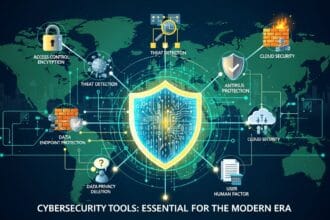AI has arrived in several business spheres. While the rest of the world is discussing its impact and dealing with changes in workflows, cybersecurity experts have long dealt with the use of AI in malicious attacks.
Despite this experience, AI’s increasing sophistication has always resulted in security experts playing catch up. As attackers use more self-learning algorithms to penetrate networks, static security postures have become obsolete.
So, what should companies do? Here are 3 principles every organization must implement to combat AI’s rise in data breaches.
Conduct cybersecurity simulations
Simulation isn’t the first process experts think of when asked about creating strong security frameworks. However, cybersecurity simulation is much more than installing a platform. It is a philosophy. Continuously testing your security posture is an example of a simulation.
By probing and mimicking methods attackers use to penetrate your system, you’ll learn which holes to plug and where your weaknesses lie. Security simulation also involves creating a breach scenario and testing how well your organization responds.
These exercises, much like drills, give your organization the chance to install robust processes and train employees to take the right action. Simulation also extends to security training measures. For instance, you can gamify security training and use data to create tailored learning paths.
This method is in direct contrast to the typical security training program that relies on lectures or seminars delivered by security experts. These seminars build awareness but do not ensure employees change their behavior when confronted with a challenging situation. They’re just as likely to fall prey to an attacker even if they’re aware of an attack vector.
Simulation drills help them understand the importance of their actions in a controlled environment. They can make mistakes and learn from them. Best of all, a simulation takes care of differing levels of security awareness and delivers the right lessons for everyone.
For instance, why should a developer receive the same lessons as a sales associate? Their technical abilities are different, and the training they receive must reflect this. Simulation helps you account for these disparities seamlessly.
Adopt zero trust protocols
The average enterprise relies on an infrastructure sprawl that includes microservices, cloud containers, and DevOps pipelines. These entities are mostly automated since manually executing and maintaining them is close to impossible.
However, security protocols are still largely manual. For instance, despite the shift left via DevSecOps, security remains a hurdle for developers to overcome instead of integrating. Security teams develop code templates for developers but still manually check in when access is needed.
As a result, a lot of access is predetermined to ensure optimal app performance. The problem is these hard coded access controls offer an easy way for malicious actors to infiltrate systems. Conducting pentests on such infrastructure is pointless since the foundations are weak.
Zero Trust, or ZK, is the best way to combat this problem. ZK fits nicely with the DevOps framework by relying on automation and APIs to connect the sprawled infrastructure in an organization. This leaves security teams with more time to focus on issues that matter.
ZK tools also allow security teams to grant time-based access and impose additional cryptographic controls over their cloud containers. Thus, you can control your data even it if resides with a CSP. A breach in the CSP’s security keys will not affect you since the additional layer protects you.
In addition to ZK, you can also follow time-tested security frameworks such as MITRE ATT&CK to ensure your security apparatus follows best practices. Security frameworks prevent you from reinventing the wheel and give you a set of workflows to replicate easily.
The result is a robust framework right out of the gate that is pre validated by industry experts.
Examine your operations
DevOps is present in almost every organization these days but it tends to ignore security’s role in creating a great product. ZK security tools help you shift security left, but to create a security culture, you must dig deeper and examine your processes.
Typically, security is a cultural question, rather than a process-based one. Developers are used to operating on tight schedules and will likely not be able to incorporate new security-based measures. The key to including security is to automate and integrate it into the DevOps pipeline.
The first step is to use code templates pre-validated for security. Next, embed a security team member within every development team. This way, developers have easy access to an expert when they need help. Lastly, your company’s executives must preach the importance of security in creating a great product.
Security is as much a product feature as any functionality you’re developing so communicate this to your employees. Over time, they’ll get the message and begin taking security seriously. Every employee is now responsible for security given AI’s sharp rise.
AI is here to stay
Cybersecurity simulation, ZT, and ops overhauls are great ways to combat the threat AI poses to security postures. At the end of the day, security is a matter of culture. Treating it as such will deliver great results. When combined with the right tools, you will manage to significantly reduce your risk of a data breach.









